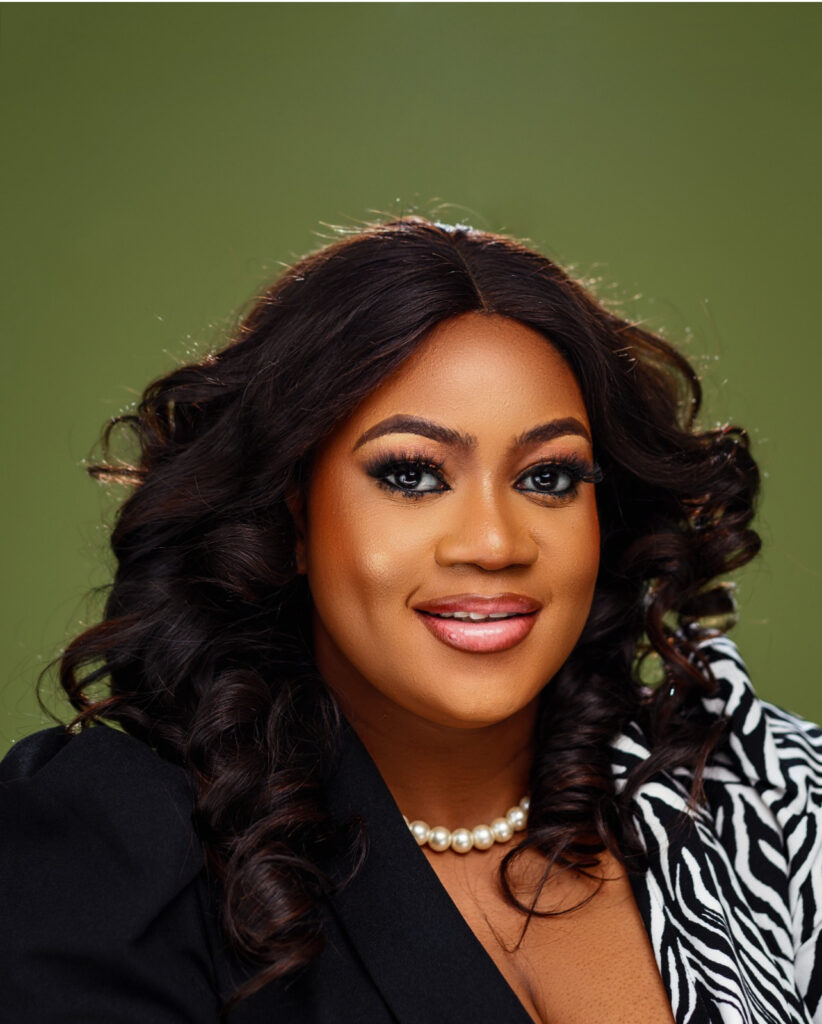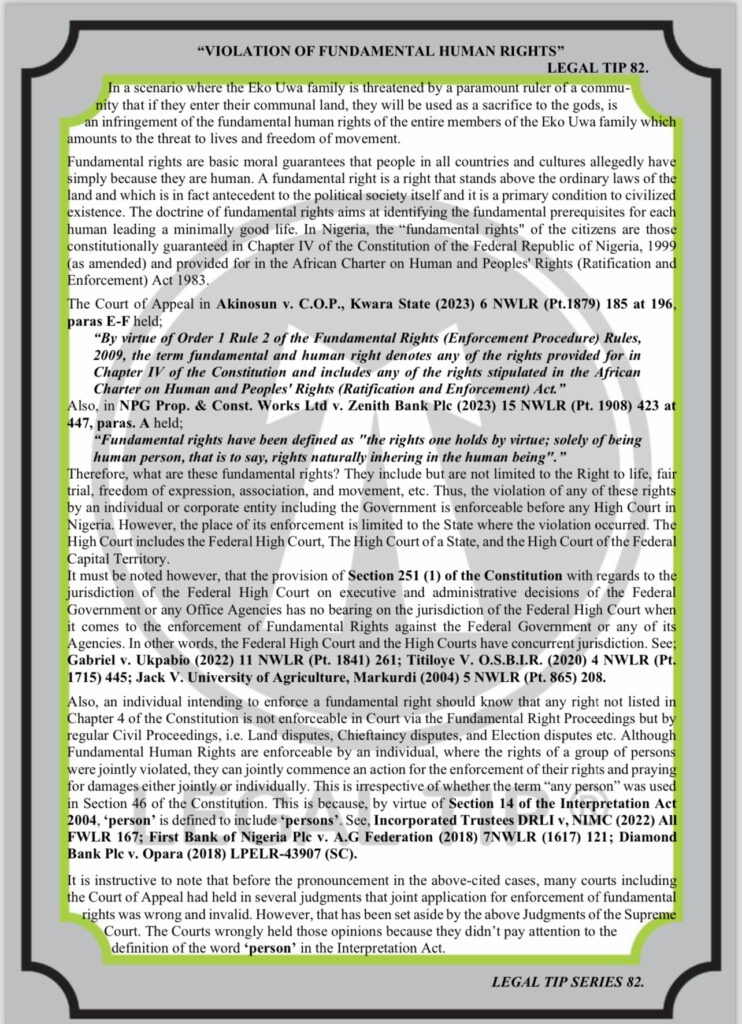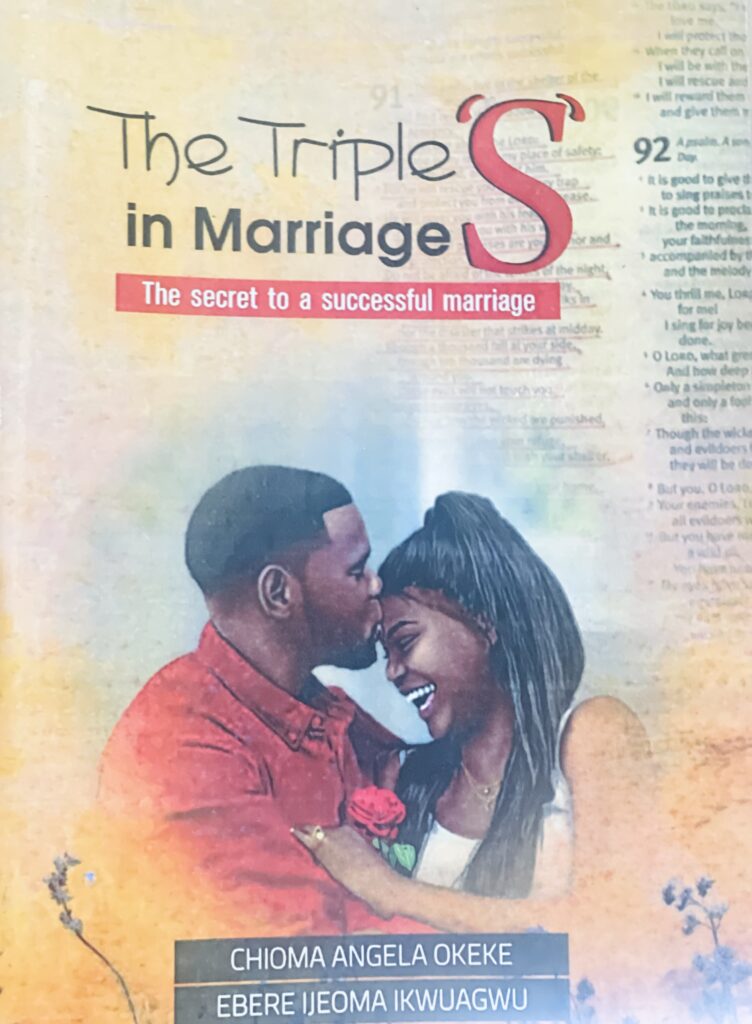
“VIOLATION OF FUNDAMENTAL HUMAN RIGHTS”
LEGAL TIP 82.
In a scenario where the Eko Uwa family is threatened by a paramount ruler of a commu-nity that if they enter their communal land, they will be used as a sacrifice to the gods, is
an infringement of the fundamental human rights of the entire members of the Eko Uwa family which amounts to the threat to lives and freedom of movement.
Fundamental rights are basic moral guarantees that people in all countries and cultures allegedly have simply because they are human. A fundamental right is a right that stands above the ordinary laws of the land and which is in fact antecedent to the political society itself and it is a primary condition to civilized existence. The doctrine of fundamental rights aims at identifying the fundamental prerequisites for each human leading a minimally good life. In Nigeria, the “fundamental rights” of the citizens are those constitutionally guaranteed in Chapter IV of the Constitution of the Federal Republic of Nigeria, 1999 (as amended) and provided for in the African Charter on Human and Peoples’ Rights (Ratification and Enforcement) Act 1983.

The Court of Appeal in Akinosun v. C.O.P., Kwara State (2023) 6 NWLR (Pt.1879) 185 at 196, paras E-F held;
“By virtue of Order 1 Rule 2 of the Fundamental Rights (Enforcement Procedure) Rules, 2009, the term fundamental and human right denotes any of the rights provided for in Chapter IV of the Constitution and includes any of the rights stipulated in the African Charter on Human and Peoples’ Rights (Ratification and Enforcement) Act.”
Also, in NPG Prop. & Const. Works Ltd v. Zenith Bank Plc (2023) 15 NWLR (Pt. 1908) 423 at 447, paras. A held;
“Fundamental rights have been defined as “the rights one holds by virtue; solely of being human person, that is to say, rights naturally inhering in the human being”.”
Therefore, what are these fundamental rights? They include but are not limited to the Right to life, fair trial, freedom of expression, association, and movement, etc. Thus, the violation of any of these rights by an individual or corporate entity including the Government is enforceable before any High Court in Nigeria. However, the place of its enforcement is limited to the State where the violation occurred. The High Court includes the Federal High Court, The High Court of a State, and the High Court of the Federal Capital Territory.
It must be noted however, that the provision of Section 251 (1) of the Constitution with regards to the jurisdiction of the Federal High Court on executive and administrative decisions of the Federal Government or any Office Agencies has no bearing on the jurisdiction of the Federal High Court when it comes to the enforcement of Fundamental Rights against the Federal Government or any of its Agencies. In other words, the Federal High Court and the High Courts have concurrent jurisdiction. See; Gabriel v. Ukpabio (2022) 11 NWLR (Pt. 1841) 261; Titiloye V. O.S.B.I.R. (2020) 4 NWLR (Pt. 1715) 445; Jack V. University of Agriculture, Markurdi (2004) 5 NWLR (Pt. 865) 208.
Also, an individual intending to enforce a fundamental right should know that any right not listed in Chapter 4 of the Constitution is not enforceable in Court via the Fundamental Right Proceedings but by regular Civil Proceedings, i.e. Land disputes, Chieftaincy disputes, and Election disputes etc. Although Fundamental Human Rights are enforceable by an individual, where the rights of a group of persons were jointly violated, they can jointly commence an action for the enforcement of their rights and praying for damages either jointly or individually. This is irrespective of whether the term “any person” was used in Section 46 of the Constitution. This is because, by virtue of Section 14 of the Interpretation Act 2004, ‘person’ is defined to include ‘persons’. See, Incorporated Trustees DRLI v, NIMC (2022) All FWLR 167; First Bank of Nigeria Plc v. A.G Federation (2018) 7NWLR (1617) 121; Diamond Bank Plc v. Opara (2018) LPELR-43907 (SC).
It is instructive to note that before the pronouncement in the above-cited cases, many courts including the Court of Appeal had held in several judgments that joint application for enforcement of fundamental
rights was wrong and invalid. However, that has been set aside by the above Judgments of the Supreme
Court. The Courts wrongly held those opinions because they didn’t pay attention to the
definition of the word ‘person’ in the Interpretation Act.
LEGAL TIP SERIES 82.
About the Author
Chinelo Audrey Ofoegbunam is a dynamic, ingenious, noble, and vibrant advocate. An innovative business advanced expert who has undertaken relevant training in law and advocacy, business administration, governance, arbitration, leadership, and a host of others.
She focuses on the effective implementation of evidenced result-oriented paths, cases, fulfilled clients, and exceeds expectations. She is a generous, dedicated, and compassionate person, and indeed an advocate for justice and peace.
She has received several awards, medals of excellence, and honorary Awards for humanitarian acts. She was the best graduating student from the Chartered Institute of Arbitration (United Kingdom) in 2019, which caused her direct appointment in the Federal High Court-Alternative Dispute Resolution Centre.
Audrey is a member of several organizations to wit:
The St Vincent de Paul Society, Executive member of the Women and Girl-Child Capabilities Enhancement and Empowerment Organization (WGCCEEO), Devatop Center for Africa Development (DCAD), Nigerian Red Cross Society (NRCS), French Club Le Clezio; Young African Leadership Institute; The Nigerian Bar Association where she currently serves in an executive position as the Treasurer of the NBA Abuja Branch; The African Bar Association, Commonwealth Lawyers Association, and International Bar Association; The Nigerian Institute of Chartered Arbitrators, Chartered Institute of Arbitrators (UK), Federacion Internacional de Abogadas(FIDA); Institute of Mediation and Conciliation; Chartered Institute of Taxation, Institute of Chartered Secretaries and Administrators in Nigeria; Institute of ADR Registrars; Registrar, The Colloquium; and of the Rotary International.
Audrey is a Young African Leadership Institute Fellow, a Paul Harris Fellow, a Benefactor, an ADR Neutral, Federal High Court-Alternative Dispute Resolution Centre, and an Author of the weekly Legal Tip Series.
She speaks English, Igbo, and French; And loves playing badminton, listening to music, researching and writing, traveling, and swimming.

